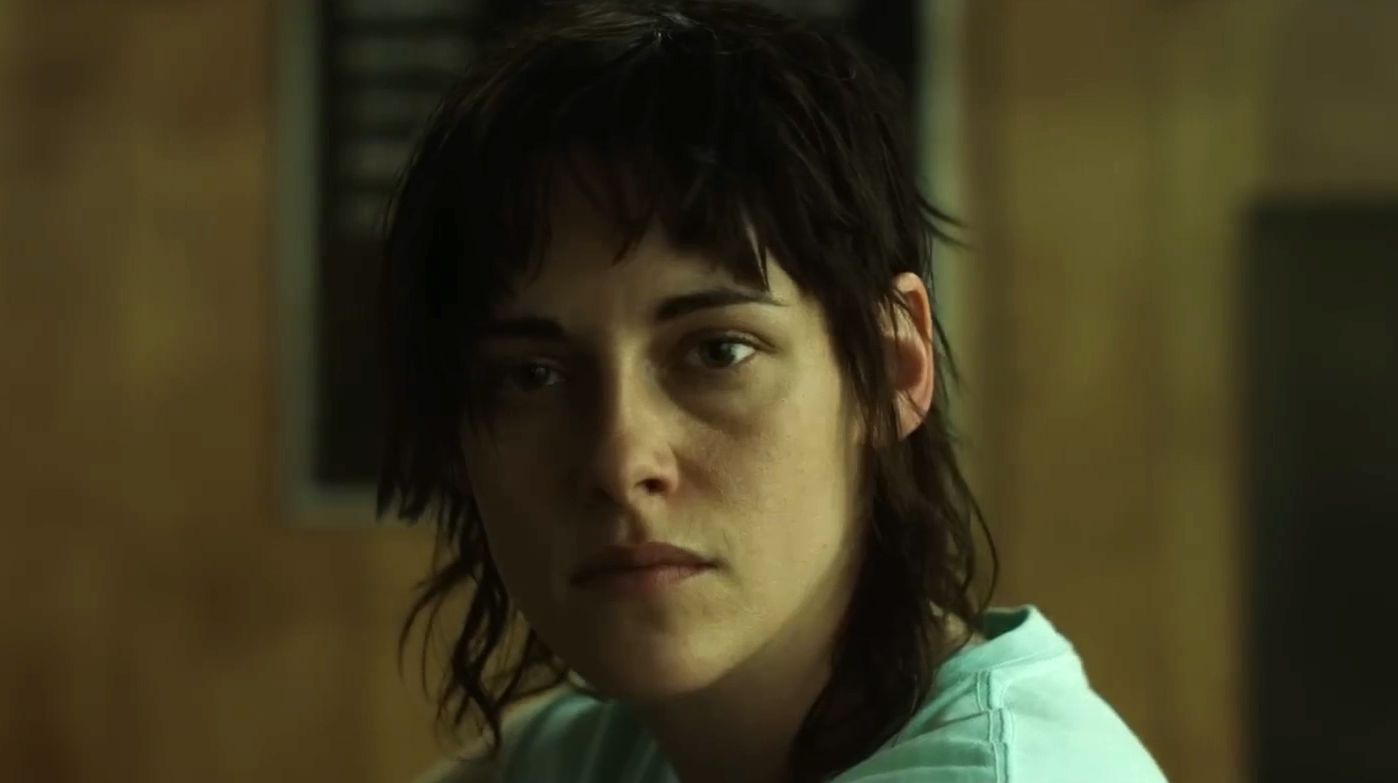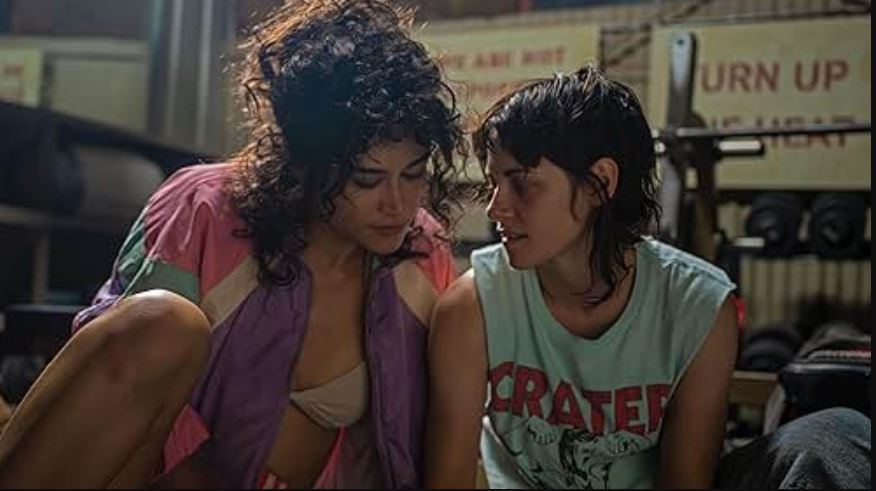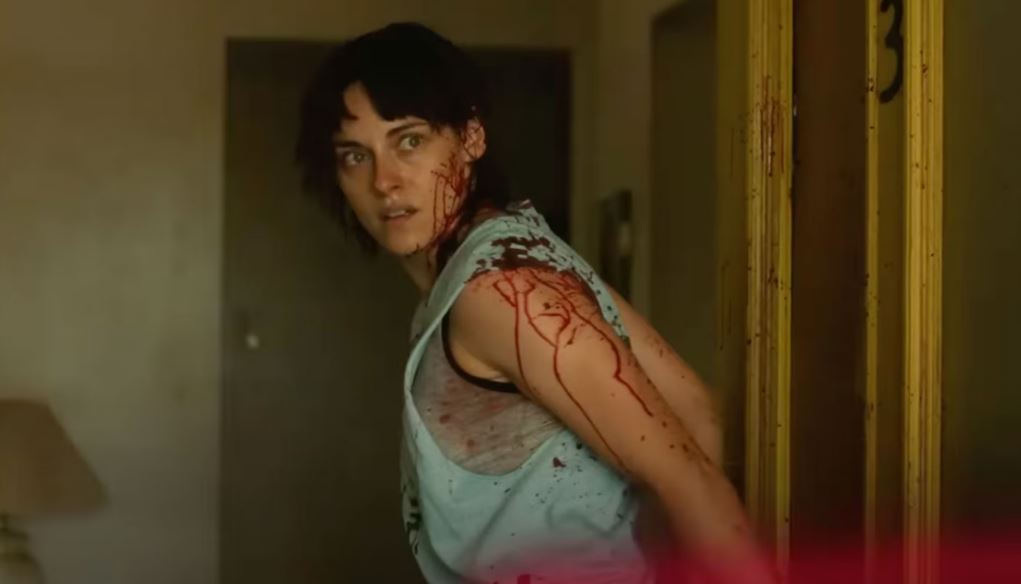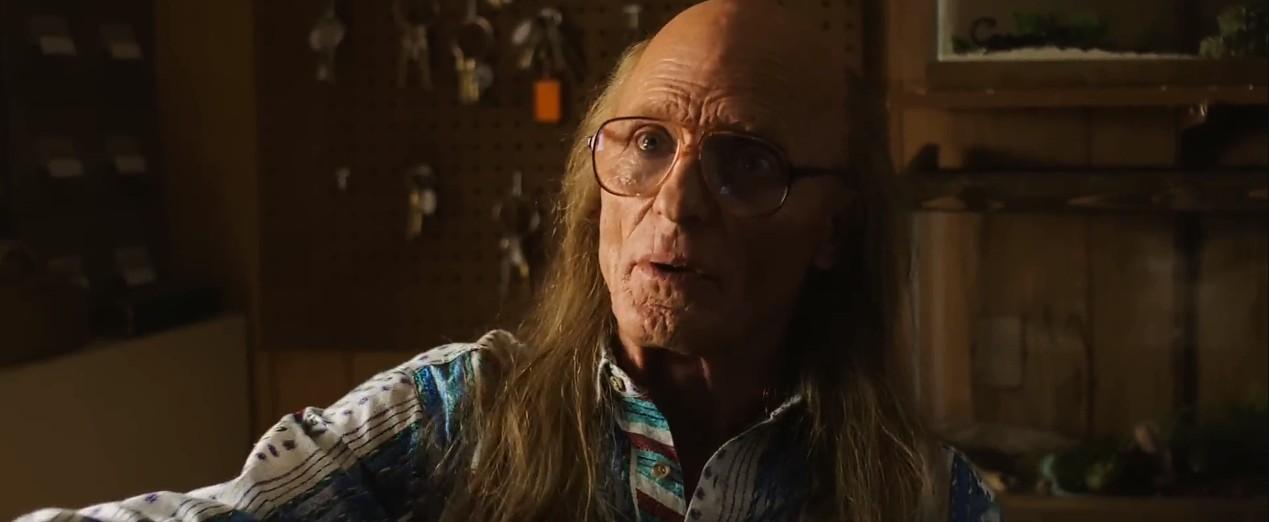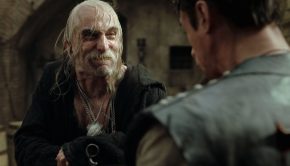Love Lies Bleeding – Film Review
Reviewed by Damien Straker on the 16th of March 2024
Nixco presents a film by Rose Glass
Written by Rose Glass and Weronika Tofilska
Produced by Andrea Cornwell and Oliver Kassman
Starring Kristen Stewart, Katy O’Brian, Ed Harris, Anna Baryshnikov, Dave Franco, and Jena Malone
Cinematography Ben Fordesman
Edited by Mark Towns
Music by Clint Mansell
Rating: MA15+
Running Time: 104 minutes
Release Date: the 14th of March 2024
If the name was not already taken Love Lies Bleeding could have been titled Bodies Bodies Bodies. Flesh was prevalent throughout Rose Glass’s directorial debut, the psychological horror thriller Saint Maud (2019). Some of the gruesome images included burnt skin on the back of a character’s hand and a pair of scissors protruding from a victim’s neck. There is no shortage of skin in Glass’s follow-up movie. Muscles are stretched out in a gym, lesbians embrace each other in the bedroom, and numerous corpses are found in the boot of a car. There is nothing subtle about these sexual and violent collisions found throughout A24’s Bleeding. It is not a deeply realistic neo-noir crime film. Rather, the frankness and immediacy are integral to Glass’s filmic style. It is a deliberately warped, nightmare-like perspective of 1980s Americana as seen through the eyes of a thirty-four-year-old British filmmaker. The style would be far less enjoyable if it weren’t so funny and deliberately over-the-top as corpses pile on top of one another.
The screenplay Glass co-wrote with Weronika Tofilska centres on an unlikely heroine. In 1989, Lou (Twilight and Spencer’s Kristen Stewart) has the lonely task of running a gym by herself in the desert. The first time we see her she has the unenviable job of unclogging a toilet. She is also avoiding her father, Lou Sr (Ed Harris). It is not because of his long stringy hair. It is because he is a violent gangster who runs a nearby shooting range. He has dumped several bodies at the bottom of a gorge. The FBI are watching Sr closely and even offer Lou their business card for safekeeping. Meanwhile, Lou gently rejects the advances of an eager gym attendee in Daisy (Dickinson’s Anna Baryshnikov). Lou is more attracted to a recent stranger in town, Jackie (Katy O’Brian). She is a gym junkie intent on entering herself into a bodybuilding contest. The two women fall in love and Jackie asks Lou to join her in Las Vegas. In one of several coincidences, Jackie is also entangled with Lou’s scummy brother-in-law, J.J. (Dave Franco). He offers Jackie a job at the shooting range in exchange for sexual favours. Jackie’s plan to travel with Lou and compete in Vegas is derailed. They are furious after Lou’s sister, Beth (Jena Malone), is violently assaulted and hospitalised by Dave. The attack sets a plot of revenge, blackmail, and violence deep into motion.
As mentioned, subtext is an afterthought among these wild physical and psychological collisions. Instead, the film’s abrasive style is intentional. Glass’s camera zooms in tight on muscles and flesh throughout the gym scenes. When juxtaposed against the prevalence of gun-loving Americans at the shooting range, Glass creates a visual binary that contrasts natural strength and mechanical violence. The night scenes and shadows around the gym infer Lou’s isolation from these two worlds. She is alone and too slight to be physically imposing in a gym but is also estranged from Sr and the crime world. The depiction of strength and loneliness is as about understated as the film becomes. Otherwise, the drama is populated with stalkers, abusers, corrupt cops, and weird psychedelic imagery. At one point, Jackie vomits on stage. The body of Lou covered in slime emerges from her mouth. Similarly, flashbacks of Lou and her father are painted as a violent and hellish through a red colour filter. Lastly, there is a critical image at the end that appears stripped from a comic book. The images and the drama are not to enforce realism. Rather, the exercise is to create a sleazy, sweaty fever dream-like atmosphere of Americana where drugs, guns, and muscles are prevalent and recall the low-budget crime thrillers of the 1980s and early 90s.
If there was meaning beneath the violence and intimidation, it would be to examine the types of power people hold over each other. Lou’s loneliness and lean physicality undoubtedly attract her towards the ripped body, swagger, and confidence of Jackie. This is a positive viewpoint of attraction and power. In contrast, Daisy, who seems clingy and dim, tries blackmailing Lou partly out of jealousy. Later, threats are made over phone calls and tense, exciting action scenes are staged. The comic shot at the end is goofy but underlines how the right people elevate you high above quick, violent impulses. Mostly though, the film is about embracing neo-noir action where people hide in cupboards, bodies are clumsily stashed away, and evil, bug-chewing villains receive their comeuppance. Glass ensures the violence is impactful but also paired with jet black humour. Thankfully, she cleverly sidesteps the artsy, self-seriousness of Drive (2011). The tongue-in-cheek humour is another means of painting this as a slick filmmaking exercise. We laugh during the situations, knowing this filmmaker is often toying with her audience and characters.
Kristen Stewart’s effortlessly cool, likeable performance is a significant reason for Bleeding’s involvement. Stewart, who is openly gay, continues embracing her own queer identity. She spends much of the film with a cigarette balancing on her lip and sweaty, mattered hair hanging over hair face. Her comfort results in clumsy, stumbling verbalisations that evokes a naturalistic acting style. It positions the actress as a deeply sympathetic lead with a solid emotional range. During a tense phone call, Sr asks if Lou is threatening him. The awkward ‘yep’ Stewart delivers is natural and comically sound. Once Lou is allowed to take control in the final quarter, the film gathers energy and is a lot of fun. We care for Lou and want to see her escape and extract a bit of pain on these terrible thugs. There is no doubting Katy O’Brian’s physical presence either. She casts a strong, unique, and imposing figure on screen. Though even among the collection of tropes and clichés Jackie’s steroid addiction is a touch superfluous. Dave Franco is a convincing sleazebag and Ed Harris is suitably unnerving, particularly in the quieter scenes where he tries offering an olive branch. Anna Baryshnikov as the stalker Daisy proves she can steal all her scenes. Out of the cast though, Stewart’s awkward naturalism makes the biggest impression.
The trajectory of the film is not unlike its protagonist. It starts off slow and gloomy to reflect Lou’s isolation. Yet it continues to build to an engaging climax as it discovers its own identity. It mirrors Lou’s arc because she becomes increasingly resourceful and resilient. It also suggests Glass realised the type of neo-noir thriller she was making and embraced the tropes of the crime genre. She knows it is one big movie. We are thrown into tense, contrived situations with implausible plot twists that see both women at the mercy of sickening villains. There is some subtext about the power people can have over others. Yet the thematic goal is secondary to the bleak edges and dark humour. It is a film where someone is strangled to death, only to have their cigarettes immediately stolen off their person. Consequently, Bleeding is an enormously fun genre exercise where we care about its heroine’s survival amid many violent collisions.
Summary: An enormously fun genre exercise where we care about the heroine’s survival amid many violent collisions.



